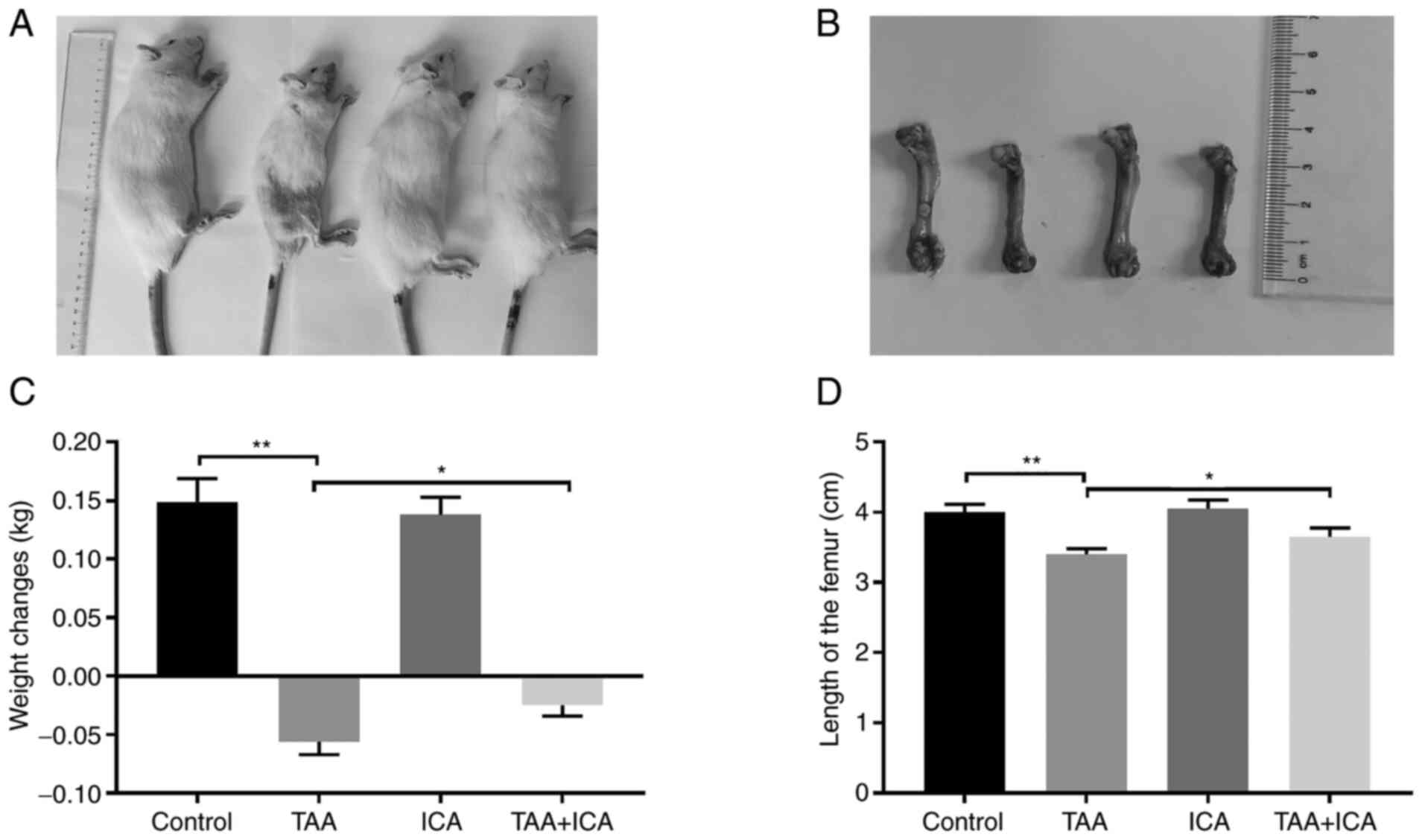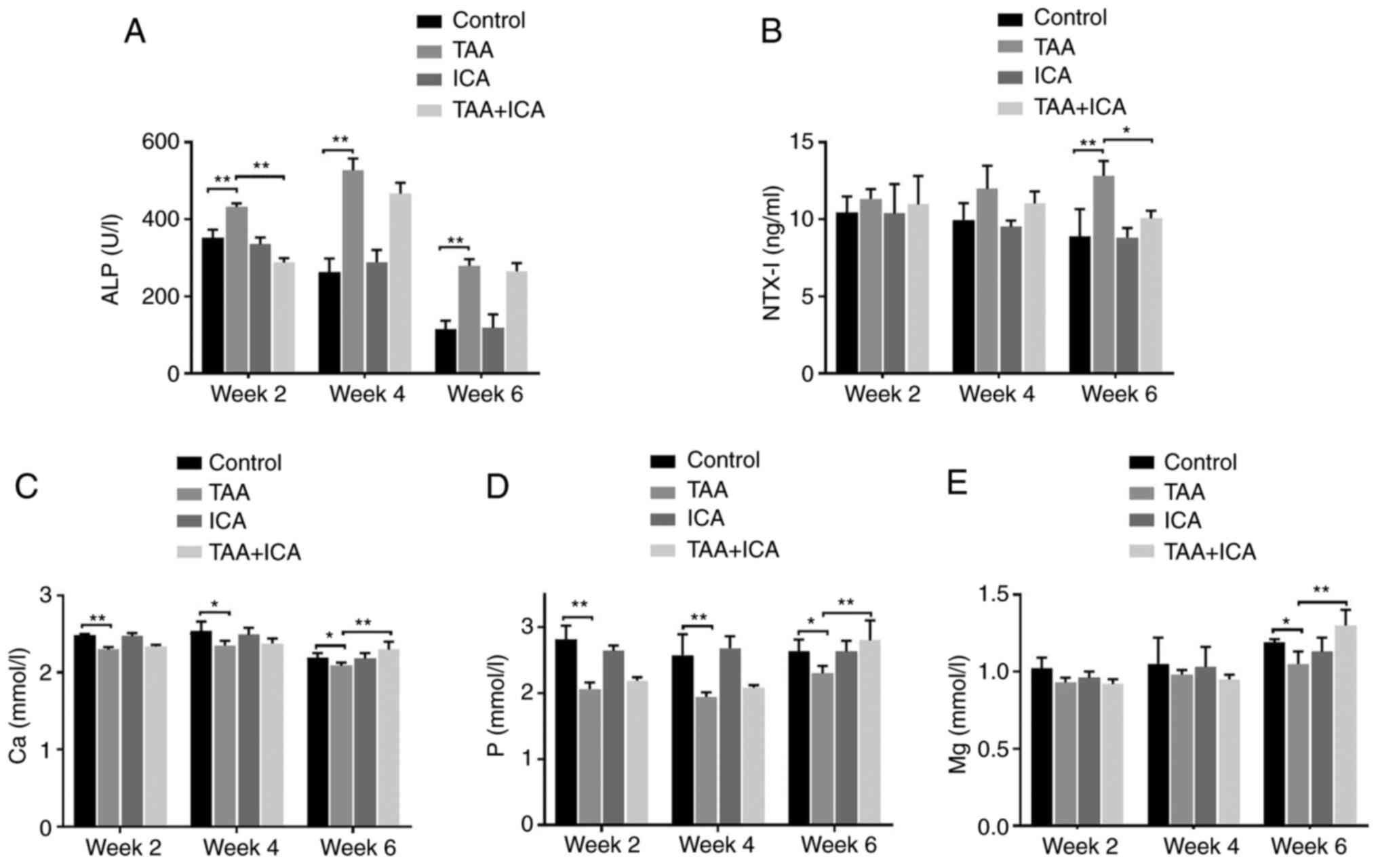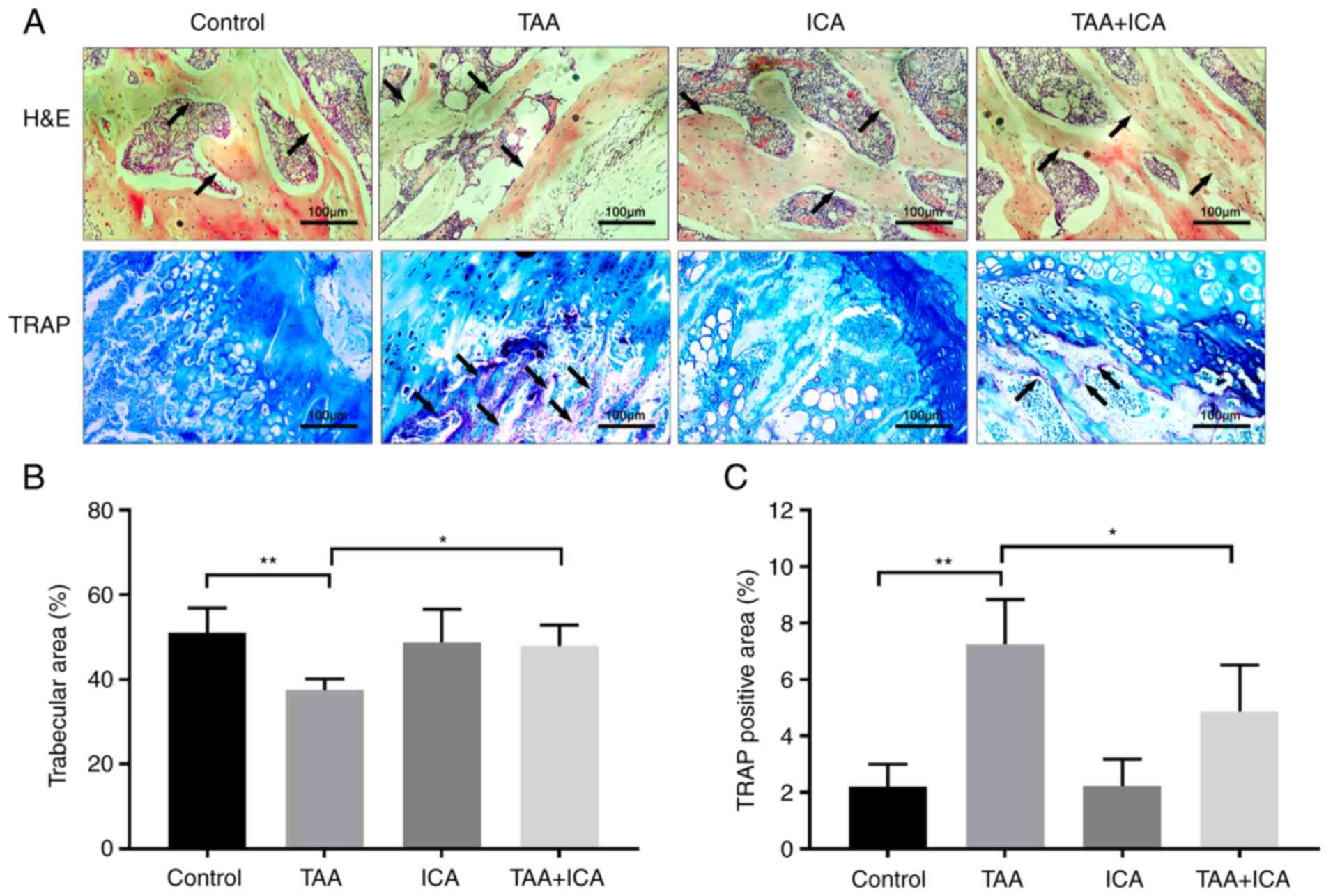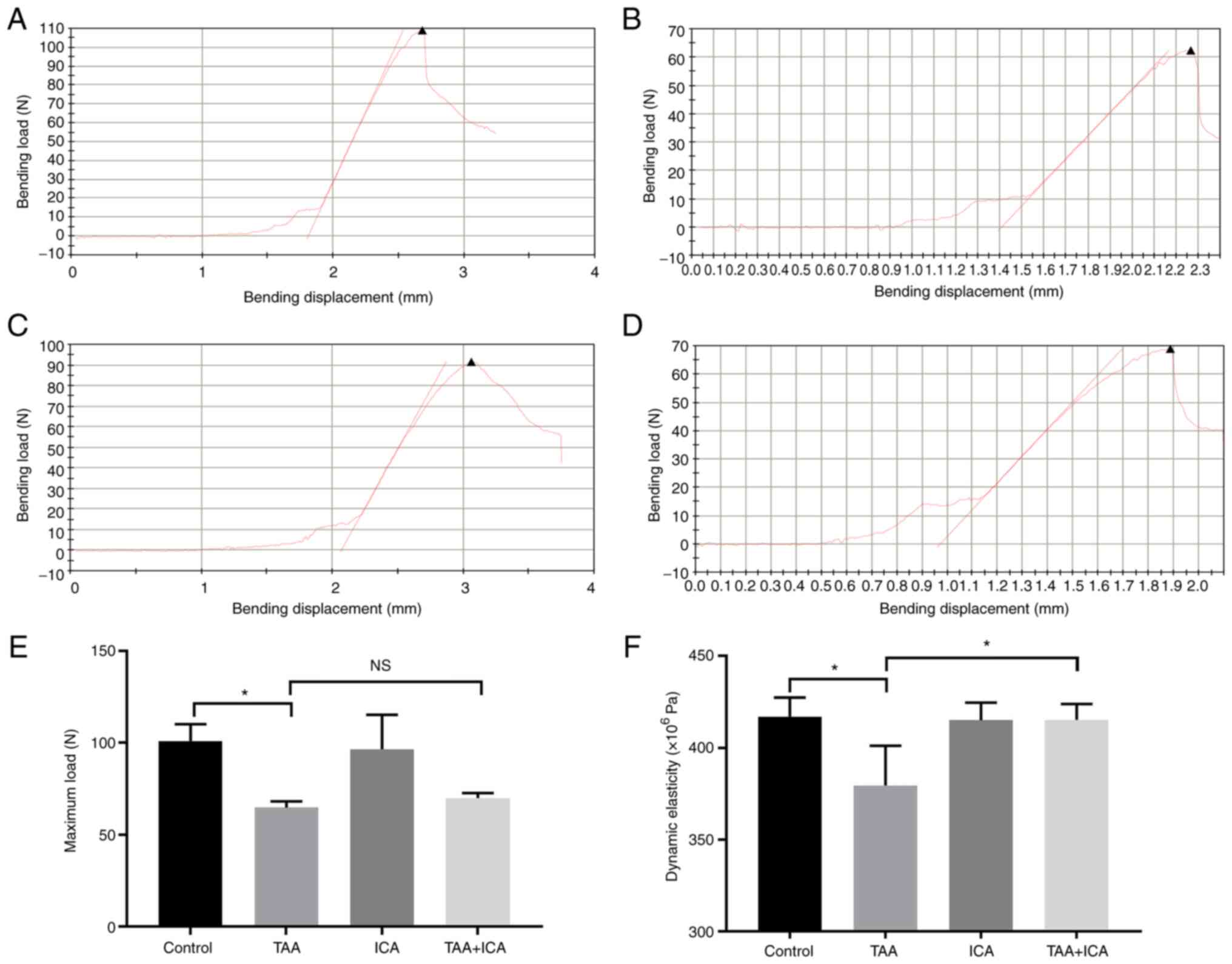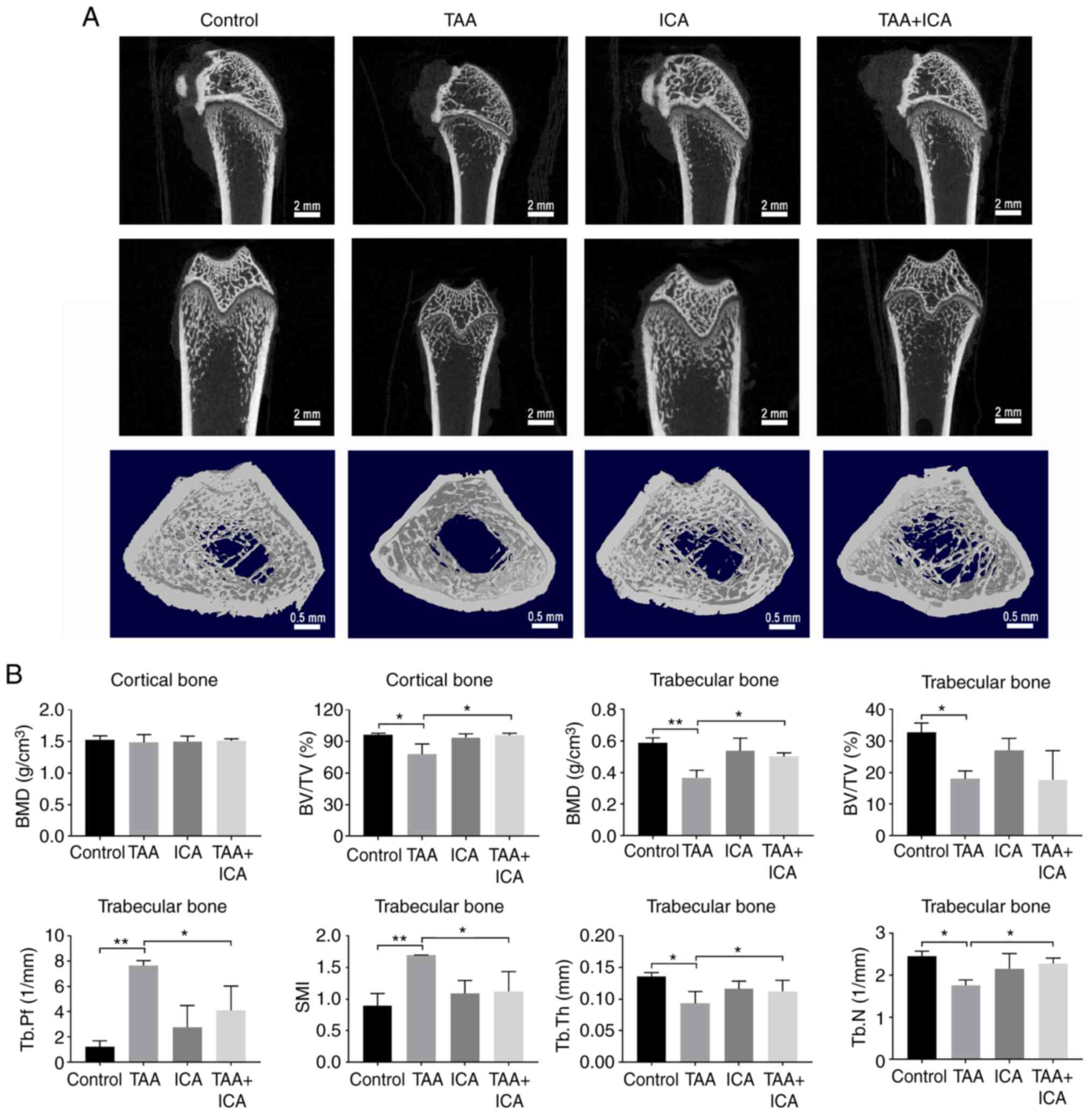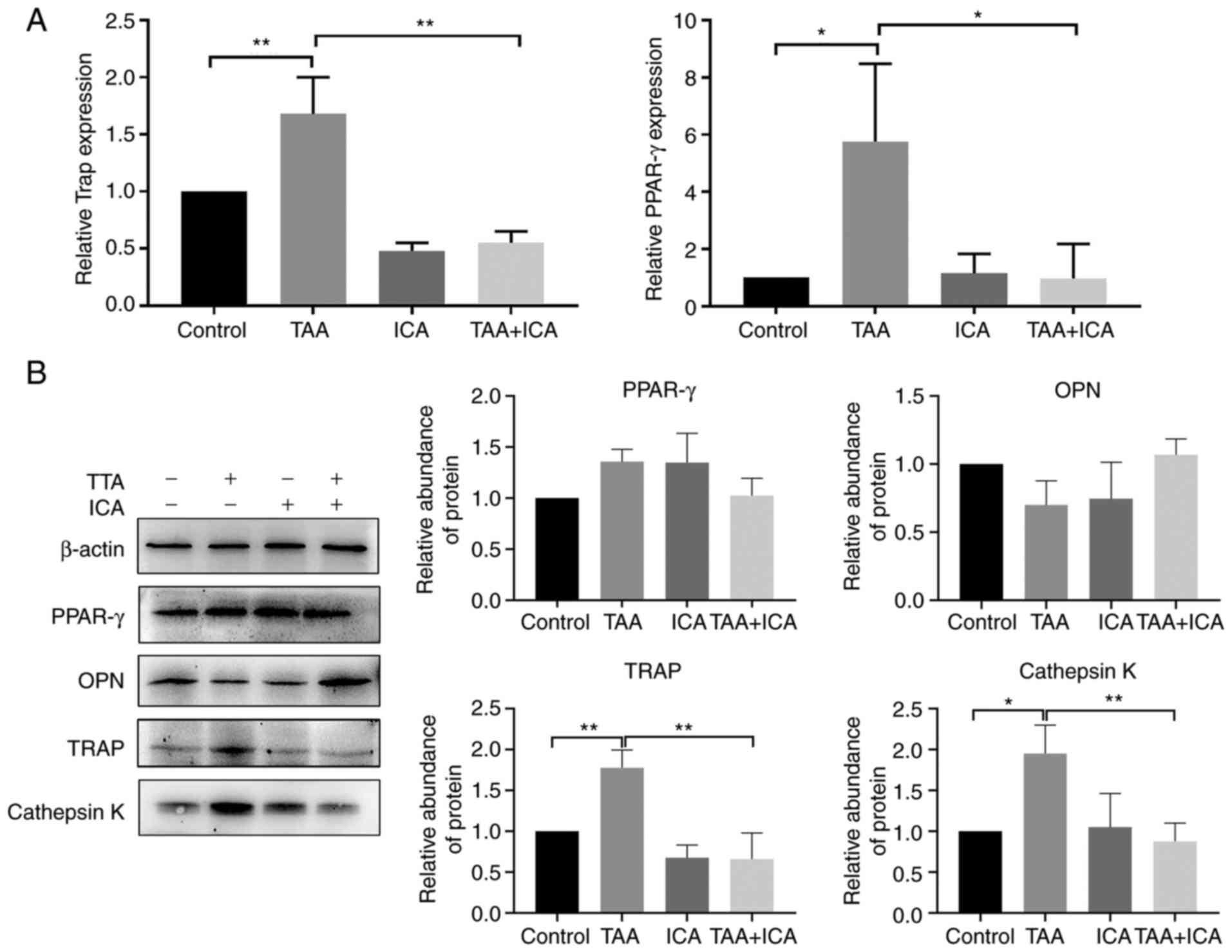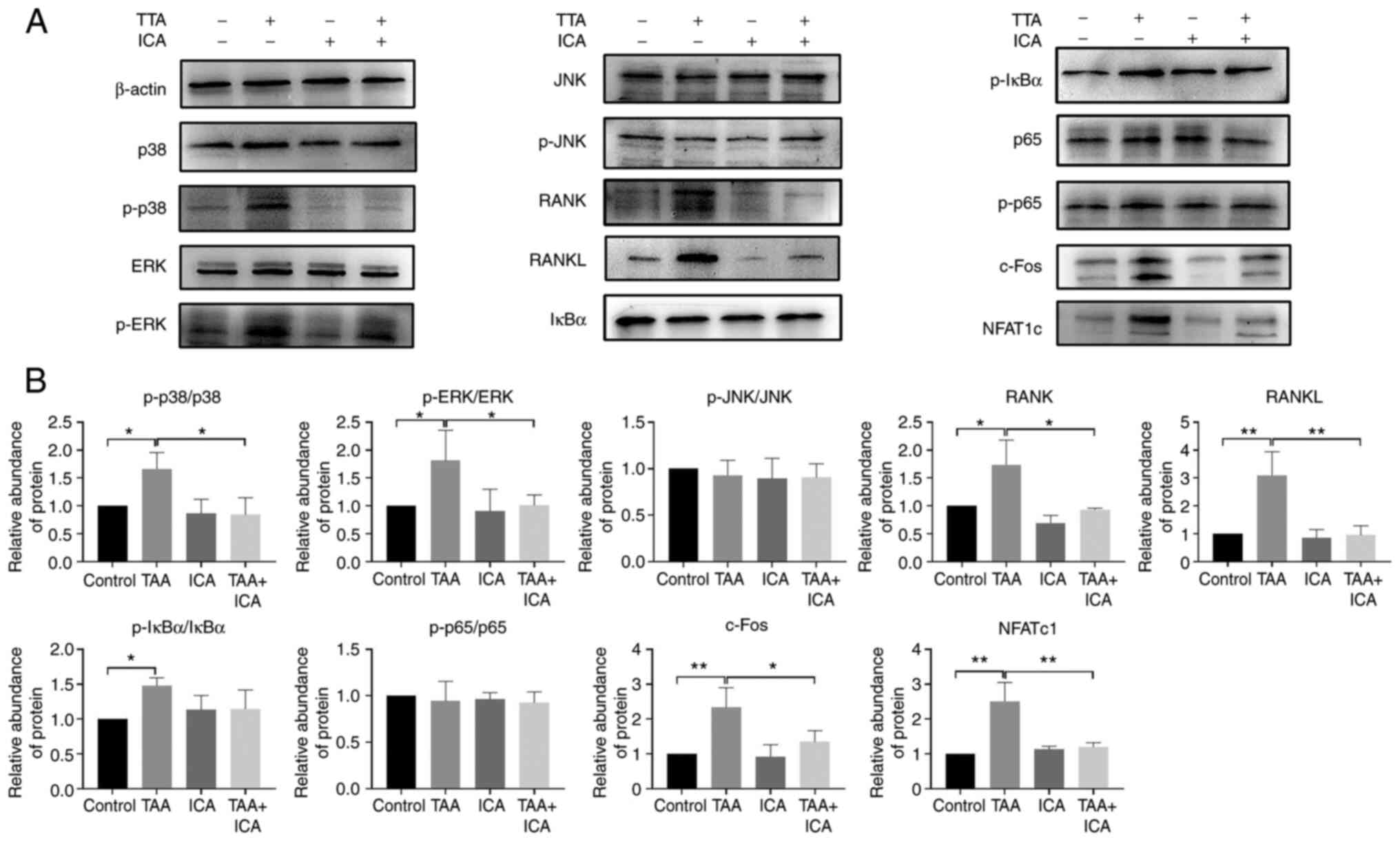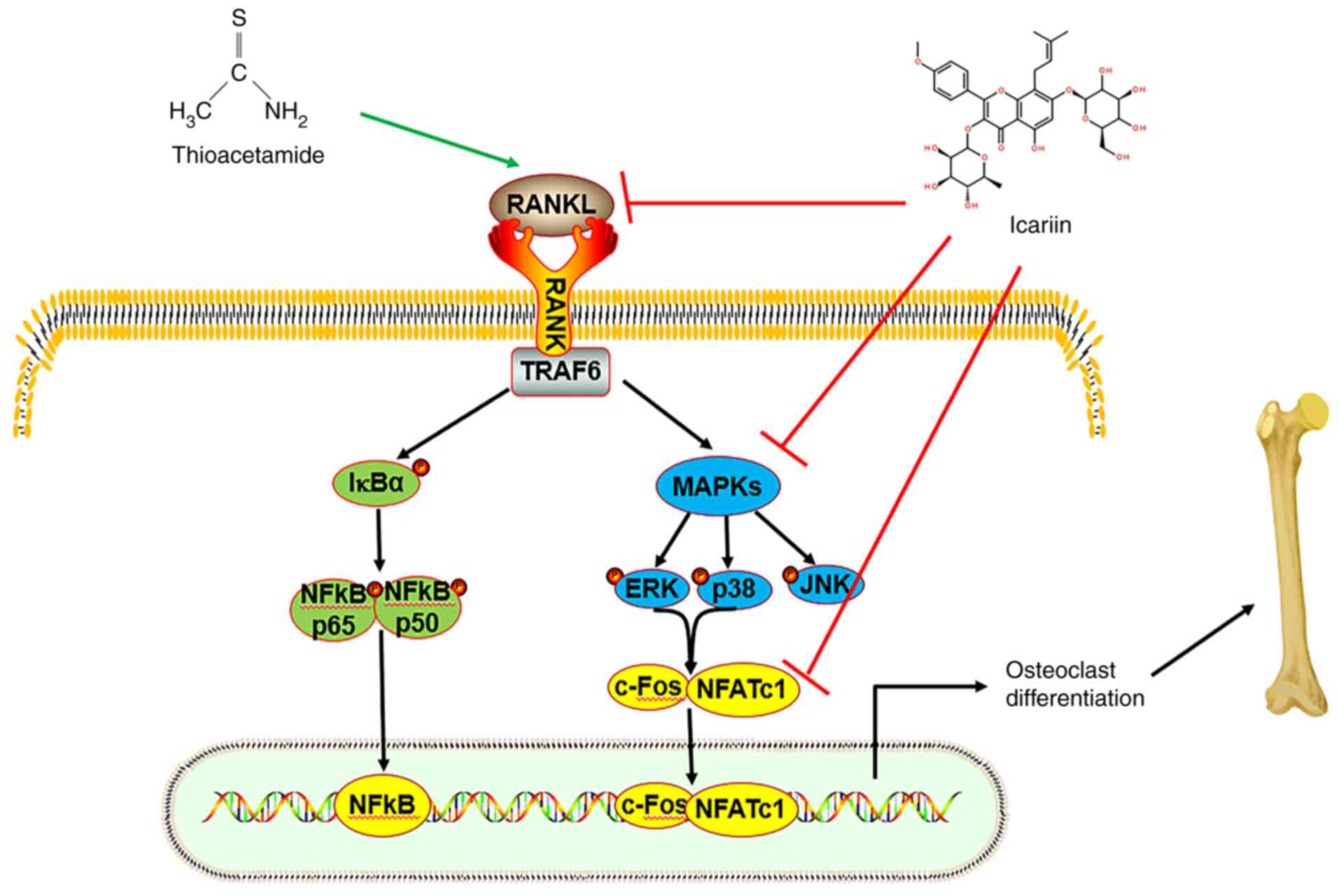|
1
|
Genant HK, Cooper C, Poor G, Reid I,
Ehrlich G, Kanis J, Nordin BE, Barrett-Connor E, Black D, Bonjour
JP, et al: Interim report and recommendations of the world health
organization task-force for osteoporosis. Osteoporosis Int.
10:259–264. 1999. View Article : Google Scholar : PubMed/NCBI
|
|
2
|
Bawa S: The significance of soy protein
and soy bioactive compounds in the prophylaxis and treatment of
osteoporosis. J Osteoporosis. 2010:8910582010. View Article : Google Scholar : PubMed/NCBI
|
|
3
|
Kenkre JS and Bassett J: The bone
remodelling cycle. Ann Clin Biochem. 55:308–327. 2018. View Article : Google Scholar : PubMed/NCBI
|
|
4
|
Huang YY, Wang ZH, Deng LH, Wang H and
Zheng Q: Oral administration of quercetin or its derivatives
inhibit bone loss in animal model of osteoporosis. Oxid Med Cell
Longev. 2020:1–21. 2020. View Article : Google Scholar
|
|
5
|
Tanaka S: RANKL-Independent
osteoclastogenesis: A long-standing controversy. J Bone Miner Res.
32:431–433. 2017. View Article : Google Scholar : PubMed/NCBI
|
|
6
|
Liu Z, Zhang M, Shen Z, Ke J, Zhang D and
Yin F: Efficacy and safety of 18 anti-osteoporotic drugs in the
treatment of patients with osteoporosis caused by glucocorticoid: A
network meta-analysis of randomized controlled trials. PLoS One.
15:e02438512020. View Article : Google Scholar : PubMed/NCBI
|
|
7
|
Looker AC, Johnston CC Jr, Wahner HW, Dunn
WL, Calvo MS, Harris TB, Heyse SP and Lindsay RL: Prevalence of low
femoral bone density in older U.S. adults from NHANES III. J Bone
Miner Res. 10:796–802. 2010. View Article : Google Scholar : PubMed/NCBI
|
|
8
|
Ma XQ, Han T, Zhang X, Wu JZ, Rahman K,
Qin LP and Zheng CJ: Kaempferitrin prevents bone lost in
ovariectomized rats. Phytomedicine. 22:1159–1162. 2015. View Article : Google Scholar : PubMed/NCBI
|
|
9
|
Hwang YH, Ha H, Kim R, Cho CW, Song YR,
Hong HD and Kim T: Anti-osteoporotic effects of polysaccharides
isolated from persimmon leaves via osteoclastogenesis inhibition.
Nutrients. 10:9012018. View Article : Google Scholar : PubMed/NCBI
|
|
10
|
Zhang Z, Zhao Q, Liu T, Zhao H, Wang R, Li
H, Zhang Y, Shan L, He B, Wang X, et al: Effect of Vicenin-2 on
ovariectomy-induced osteoporosis in rats. Biomed Pharmacother.
129:1104742020. View Article : Google Scholar : PubMed/NCBI
|
|
11
|
Topolska K, Radzki RP,
Filipiak-Florkiewicz A, Florkiewicz A, Leszczyńska T and Cieślik E:
Fructan-enriched diet increases bone quality in female growing rats
at calcium deficiency. Plant Foods Hum Nutr. 73:172–179. 2018.
View Article : Google Scholar : PubMed/NCBI
|
|
12
|
Wang Y, Chen J, Chen J, Dong C, Yan X, Zhu
Z, Lu P, Song Z, Liu H and Chen S: Daphnetin ameliorates
glucocorticoid-induced osteoporosis via activation of
Wnt/GSK-3β/β-catenin signaling. Toxicol Appl Pharm. 409:1153332020.
View Article : Google Scholar : PubMed/NCBI
|
|
13
|
Komori T: Animal models for osteoporosis.
Eur J Pharmacol. 759:287–294. 2015. View Article : Google Scholar : PubMed/NCBI
|
|
14
|
Lassila V and Virtanen P: Influence of
experimental liver injury on rat blood and alveolar bone under
stress. Acta Anat (Basel). 118:116–121. 1984. View Article : Google Scholar : PubMed/NCBI
|
|
15
|
Yao YT, Lu XR, Li Y, Zhou YK, Ren J and Xu
J: The new toxic effect of cortical bone osteoporosis induced by
thioacetamide. J Toxicol. 33:370–374. 2019.
|
|
16
|
Liang X, Hou Z, Xie Y, Yan F, Li S, Zhu X
and Cai L: Icariin promotes osteogenic differentiation of bone
marrow stromal cells and prevents bone loss in OVX mice via
activating autophagy. J Cell Biochem. 120:13121–13132. 2019.
View Article : Google Scholar : PubMed/NCBI
|
|
17
|
Wang GQ, Li DD, Huang C, Lu DS, Zhang C,
Zhou S, Liu J and Zhang F: Icariin reduces dopaminergic neuronal
loss and microglia-mediated inflammation in vivo and in vitro.
Front Mol Neurosci. 10:4412018. View Article : Google Scholar : PubMed/NCBI
|
|
18
|
Song L, Chen X, Mi L, Liu C, Zhu S, Yang
T, Luo X, Zhang Q, Lu H and Liang X: Icariin-induced inhibition of
SIRT6/NF-κB triggers redox mediated apoptosis and enhances
anti-tumor immunity in triple-negative breast cancer. Cancer Sci.
111:4242–4256. 2020. View Article : Google Scholar : PubMed/NCBI
|
|
19
|
Nian H, Ma MH, Nian SS and Xu LL:
Antiosteoporotic activity of icariin in ovariectomized rats.
Phytomedicine. 16:320–326. 2009. View Article : Google Scholar : PubMed/NCBI
|
|
20
|
Wang J, Tao Y, Ping Z, Zhang W, Hu X, Wang
Y, Wang L, Shi J, Wu X, Yang X, et al: Icariin attenuates
titanium-particle inhibition of bone formation by activating the
Wnt/β-catenin signaling pathway in vivo and in vitro. Sci Rep.
6:238272016. View Article : Google Scholar : PubMed/NCBI
|
|
21
|
Kim B, Lee KY and Park B: Icariin
abrogates osteoclast formation through the regulation of the
RANKL-mediated TRAF6/NF-κB/ERK signaling pathway in Raw264.7 cells.
Phytomedicine. 51:181–190. 2018. View Article : Google Scholar : PubMed/NCBI
|
|
22
|
Jing X, Du T, Chen K, Guo J, Xiang W, Yao
X, Sun K, Ye Y and Guo F: Icariin protects against iron
overload-induced bone loss via suppressing oxidative stress. J Cell
Physiol. 234:10123–10137. 2019. View Article : Google Scholar : PubMed/NCBI
|
|
23
|
Hassanshahi M, Su YW, Khabbazi S, Fan CM,
Tang Q, Wen X, Fan J, Chen KM and Xian CJ: Icariin attenuates
methotrexate chemotherapy-induced bone marrow microvascular damage
and bone loss in rats. J Cell Physiol. 234:1–13. 2019. View Article : Google Scholar : PubMed/NCBI
|
|
24
|
Schyman P, Printz RL, Estes SK, Boyd KL,
Shiota M and Wallqvist A: Identification of the toxicity pathways
associated with thioacetamide-induced injuries in rat liver and
kidney. Front Pharmacol. 9:12722018. View Article : Google Scholar : PubMed/NCBI
|
|
25
|
Nakano A, Kanda T and Abe H: Bone changes
and mineral metabolism disorders in rats with experimental liver
cirrhosis. J Gastroenterol Hepatol. 11:1143–1154. 1997. View Article : Google Scholar : PubMed/NCBI
|
|
26
|
El-Shwiniy WH and Sadeek SA: Synthesis and
characterization of new 2-cyano-2-(p-tolyl-hydrazono)-thioacetamide
metal complexes and a study on their antimicrobial activities.
Spectrochimica Acta A Mol Biomol Spectrosc. 137:535–546. 2014.
View Article : Google Scholar : PubMed/NCBI
|
|
27
|
Gao M, Wang M and Zheng QH: Synthesis of
carbon-11-labeled imidazopyridine- and purine-thioacetamide
derivatives as new potential PET tracers for imaging of nucleotide
pyrophosphatase/phosphodiesterase 1 (NPP1). Bioorg Med Chem Lett.
26:1371–1375. 2016. View Article : Google Scholar : PubMed/NCBI
|
|
28
|
Khattab A, Hassanin L and Zaki N:
Self-nanoemulsifying drug delivery system of coenzyme (Q10) with
improved dissolution, bioavailability, and protective efficiency on
liver fibrosis. AAPS PharmSciTech. 18:1657–1672. 2016. View Article : Google Scholar : PubMed/NCBI
|
|
29
|
Zhang Y, Han B, Wei Y, Jing J and Li J:
Icariin promotes fracture healing in ovariectomized rats. Med Sci
Monit. 26:e9245542020. View Article : Google Scholar : PubMed/NCBI
|
|
30
|
Clark JA and Sun D: Guidelines for the
ethical review of laboratory animal welfare People's Republic of
China National Standard GB/T 35892-2018 [Issued 6 February 2018
Effective from 1 September 2018]. Animal Model Exp Med. 3:103–113.
2020. View Article : Google Scholar : PubMed/NCBI
|
|
31
|
Zeng Q, Lu W, Deng Z, Wu J and Xu X:
Tablysin-15 inhibits osteoclastogenesis and LPS-induced bone loss
via attenuating the integrin αvβ3 pathway. Chem Biol Interact.
327:1091792020. View Article : Google Scholar : PubMed/NCBI
|
|
32
|
Livak KJ and Schmittgen TD: Analysis of
relative gene expression data using real-time quantitative PCR and
the 2(−Delta Delta C(T)) method. Methods. 25:402–408. 2001.
View Article : Google Scholar : PubMed/NCBI
|
|
33
|
Chen Z, Irie N, Takada Y, Shimoda K,
Miyamoto T, Nishiwaki T, Suda T and Matsuo K: Bidirectional
ephrinB2-EphB4 signaling controls bone homeostasis. Cell
Metabolism. 4:111–121. 2006. View Article : Google Scholar : PubMed/NCBI
|
|
34
|
Armas LA and Recker RR: Pathophysiology of
osteoporosis: New mechanistic insights. Endocrinol Metab Clin North
Am. 41:475–486. 2012. View Article : Google Scholar : PubMed/NCBI
|
|
35
|
Virtanen P and Lassila V: Influence of
thioacetamide-provoked liver injury on female rat blood and
alveolar bone under stress. Acta Anat (Basel). 127:285–289. 1986.
View Article : Google Scholar : PubMed/NCBI
|
|
36
|
Qi S, He J, Zheng H, Chen C and Lan S:
Icariin prevents diabetes-induced bone loss in rats by reducing
blood glucose and suppressing bone turnover. Molecules.
24:18712019. View Article : Google Scholar : PubMed/NCBI
|
|
37
|
Cui J, Zhu M, Zhu S, Wang G, Xu Y and Geng
D: Inhibitory effect of icariin on Ti-induced inflammatory
osteoclastogenesis. J Surg Res. 192:447–453. 2014. View Article : Google Scholar : PubMed/NCBI
|
|
38
|
Liu CT, Shivani S, Xu H, McLean RR, Broe
KE, Hannan MT, Boyd SK, Bouxsein ML, Kiel DP and Samelson EJ:
Long-term and recent weight change are associated with reduced
peripheral bone density, deficits in bone microarchitecture, and
decreased bone strength: The framingham osteoporosis study. J Bone
Miner Res. 33:1851–1858. 2018. View Article : Google Scholar : PubMed/NCBI
|
|
39
|
Oršolić N, Nemrava J, Jeleč Ž, Kukolj M,
Odeh D, Terzić S, Fureš R, Bagatin T and Bagatin D: The beneficial
effect of proanthocyanidins and icariin on biochemical markers of
bone turnover in rats. Int J Mol Sci. 19:27462018. View Article : Google Scholar : PubMed/NCBI
|
|
40
|
Zhang J, Fu Q, Ren Z, Wang Y, Wang C, Shen
T, Wang G and Wu L: Changes of serum cytokines-related Th1/Th2/Th17
concentration in patients with postmenopausal osteoporosis. Gynecol
Endocrinol. 31:183–190. 2014. View Article : Google Scholar : PubMed/NCBI
|
|
41
|
Yang W, Zhang Y, Yang J, Tan L and Yang K:
Potential antiosteoporosis effect of biodegradable magnesium
implanted in STZ-induced diabetic rats. J Biomed Mater Res A.
99:386–394. 2011. View Article : Google Scholar : PubMed/NCBI
|
|
42
|
Jing Z, Wang C, Yang Q, Wei X, Jin Y, Meng
Q, Liu Q, Liu Z, Ma X, Liu K, et al: Luteolin attenuates
glucocorticoid-induced osteoporosis by regulatingERK/Lrp-5/GSK-3β
signaling pathway in vivo and in vitro. J Cell Physiol.
234:4472–4490. 2019. View Article : Google Scholar : PubMed/NCBI
|
|
43
|
Dénarié D, Constant E, Thomas T and
Marotte H: Could biomarkers of bone, cartilage or synovium turnover
be used for relapse prediction in rheumatoid arthritis patients?
Mediators Inflamm. 2014:5373242014. View Article : Google Scholar : PubMed/NCBI
|
|
44
|
Feng M, Zhang RR, Gong F, Yang P, Fan L,
Ni J, Bi W, Zhang Y, Wang C and Wang K: Protective effects of
necrostatin-1 on glucocorticoid-induced osteoporosis in rats. J
Steroid Biochem Mol Biol. 144:455–462. 2014. View Article : Google Scholar : PubMed/NCBI
|
|
45
|
Liu X, Fan JB, Hu J, Li F, Yi R, Tan F and
Zhao X: Lactobacillus Fermentum ZS40 prevents secondary
osteoporosis in wistar rat. Food Sci Nutr. 8:5182–5191. 2020.
View Article : Google Scholar : PubMed/NCBI
|
|
46
|
Xu H, Zhou S, Qu R, Yang Y, Gong X, Hong
Y, Jin A, Huang X, Dai Q and Jiang L: Icariin prevents oestrogen
deficiency-induced alveolar bone loss through promoting
osteogenesis via STAT3. Cell Prolif. 53:e127432020. View Article : Google Scholar : PubMed/NCBI
|
|
47
|
Huang M, Wang Y and Peng R: Icariin
alleviates glucocorticoid-induced osteoporosis through
EphB4/Ephrin-B2 axis. Evid Based Complement Alternat Med.
2020:29824802020. View Article : Google Scholar : PubMed/NCBI
|
|
48
|
Guo J, Ren R, Sun K, Yao X, Lin J, Wang G,
Guo Z, Xu T and Guo F: PERK controls bone homeostasis through the
regulation of osteoclast differentiation and function. Cell Death
Dis. 11:8472020. View Article : Google Scholar : PubMed/NCBI
|
|
49
|
Boyce BF: Advances in the regulation of
osteoclasts and osteoclast functions. J Dent Res. 92:860–867. 2013.
View Article : Google Scholar : PubMed/NCBI
|
|
50
|
Chen KM, Ge BF, Liu XY, Ma PH, Lu MB, Bai
MH and Wang Y: Icariin inhibits the osteoclast formation induced by
RANKL and macrophage-colony stimulating factor in mouse bone marrow
culture. Pharmazie. 62:388–391. 2007.PubMed/NCBI
|
|
51
|
Feng R, Feng L, Yuan Z, Wang D, Wang F,
Tan B, Han S, Li T, Li D and Han Y: Icariin protects against
glucocorticoid-induced osteoporosis in vitro and prevents
glucocorticoid-induced osteocyte apoptosis in vivo. Cell Biochem
Biophys. 67:189–197. 2013. View Article : Google Scholar : PubMed/NCBI
|















